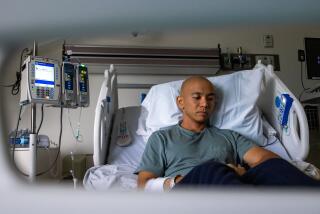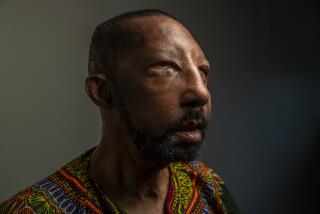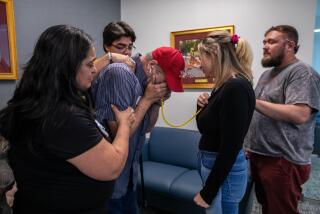Desperate Search for a Cure
When a 1-year-old foundling was placed in their arms in China’s Hunan province, adoptive parents Linda and Owen Wells felt they had been given the greatest possible gift. Now they are turning to people of Chinese ancestry to help keep that precious gift alive.
The first signs of trouble appeared two years ago, a day after Kailee Wells’ fifth birthday party. The normally effervescent child grew listless and feverish. Within days, she began hemorrhaging from her eyes, nose and mouth.
Doctors soon determined that Kailee had severe aplastic anemia, a rare and potentially deadly disease that can be cured by a bone marrow transplant. Kailee’s best chance for a long and healthy life, doctors say, is to find a perfect donor -- most likely an Asian.
So now, in a race against time, Asians for Miracle Marrow Matches will hold bone marrow drives this weekend at 99 Ranch Market stores in San Gabriel and Artesia, hoping to draw as many as 400 potential donors.
For two years, Kailee’s family has coordinated a series of such drives, desperately seeking a donor with compatible marrow.
The quest took Linda Wells twice from her home in Albuquerque, N.M., to China, where she attempted unsuccessfully to locate Kailee’s biological family, who would have afforded the best chance for a match.
The Wells family’s efforts have contributed to the global awareness of the need for bone marrow donors, said Madhuri Mistry, a spokeswoman for Asians for Miracle Marrow Matches in Los Angeles.
In Albuquerque, a drive attracted 543 donors. Last year, a drive in China drew 53,000 new donors, and events staged in various other countries added 50,000 registrants.
So far, matches have been found for two girls, ages 15 and 8. The older girl had a successful transplant, and the 8-year-old is awaiting her transplant, according to materials provided by the family. But Kailee is still waiting.
The costs of this urgent globe-trotting have prompted the Wellses to take drastic action -- all for the love of a round-faced cherub who must endure frequent blood transfusions at a hospital in far-off Milwaukee and wants only to be rid of “my stupid aplastic anemia.”
“We sold our expensive house and nice cars and liquidated all our assets,” said Owen Wells, choking back tears in a telephone interview Tuesday. “Someday, we will be prosperous again. But there’s nothing more important than a child’s life.”
Wells, 53, who has a graphic design and printing business, is scheduled to announce the weekend drives at an 11 a.m. news conference today.
As dozens of adults work on her behalf, Kailee spends her days with her mother in the Milwaukee home the family has rented near the Children’s Hospital of Wisconsin and the specialists who are treating her.
Aplastic anemia causes the bone marrow, the spongy red tissue inside the bones, to stop producing red and white blood cells and the platelets that control bleeding by forming blood clots. Doctors are uncertain what causes the disease, but some suspect environmental toxins or viruses. Patients are treated with drugs or bone marrow transplants.
At the moment, Kailee’s situation is not dire, but the long-term outlook remains serious, said David A. Margolis, a pediatric oncologist at the Medical College of Wisconsin and Children’s Hospital who directs Kailee’s treatment.
“Right now,” Margolis said, “Kailee is reasonably well, which is defined as not having serious infections or complications. On the other hand, I would love to have a 10 out of 10 DNA level match for Kailee.”
Margolis said the National Marrow Donor Program registry has located donors that are acceptable for Kailee but not ideal.
“We need the mythical needle in a haystack,” he said. He praised Kailee’s parents for helping to find that needle.
As they wait to find that perfect match, Kailee pops in for frequent transfusions of red blood cells and platelets. But even this entails risk. The more blood cells she gets, Margolis said, the more likely it is that rising iron levels could damage her organs.
Still, at her doctors’ suggestion, Kailee has returned to second grade. After missing a good bit of school for fear of exposure to infections, she is now a “much happier child,” Margolis said.
Targeting Asian communities, Margolis said, “is a brilliant idea.” In addition to drives in the Southland, Owen Wells is helping to organize events in New York, Boston, Atlanta, Chicago, Seattle and other cities with large Asian populations.
The National Marrow Donor Program, based in Minneapolis, maintains the world’s largest and most diverse registry, with more than 5 million potential volunteer donors. Of those, only about 7% -- or 350,000 -- are people of Asian or Pacific Islander ancestry, said Mistry of Asians for Miracle Marrow Matches. The dearth of Asian donors hurts Kailee’s chances.
Only rarely is a match found outside a person’s race, but mixed-race donors might also help Kailee. Tests to determine her genetic makeup revealed that she has dollops of European and New Zealand Maori blood.
Kailee was just 10 days old when she was found on Jan. 14, 1997, on the steps of the Teacher’s Training Institute in Changde. She was taken to an orphanage, where she lived for a year before Owen and Linda Wells adopted her. As the photos on Kailee’s website -- www.kaileegetwells.com -- demonstrate, she has thrived -- dressing as a princess, burying herself in autumn leaves, digging sand at the beach.
But her illness remains ever present. On Jan. 4, as Kailee celebrated her seventh birthday with chocolate cake topped by pink frosting, she told Linda Wells: “Mommy, I am going to miss you when I die.”
As Owen Wells readied to rack up a few thousand more frequent flier miles, he recalled that Kailee’s Chinese name was Chang Ban, which he said translates as “never to be alone.”
The bone marrow donor drives will be held from 11 a.m. to 4 p.m. Saturday and Sunday at the 99 Ranch Market stores at 140 W. Valley Blvd. in San Gabriel and at 17713 Pioneer Blvd. in Artesia.
For more information about these and other drives, visit www.asianmarrow.org.
More to Read
Sign up for Essential California
The most important California stories and recommendations in your inbox every morning.
You may occasionally receive promotional content from the Los Angeles Times.











